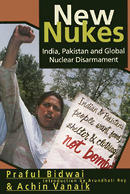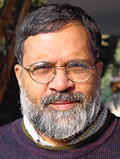 |
January 1, 2004Pakistan's Help to Iran, Libya Hikes Nuke PerilRevelations that Pakistan's scientists may have helped Iran's and Libya's secret nuclear programs raise worrisome questions about nuclear danger in South Asia, which has been described as the world's most dangerous place. They also call for major policy changes and new arrangements for export controls on nuclear materials, and more generally, to prevent nuclear proliferation. These revelations were made when Iran shared sensitive information about its uranium enrichment program with the International Atomic Energy Agency (IAEA), a U.N. organization, two months ago. Further disclosures came when Libya held clandestine talks with U.S. and British officials just before declaring on Dec. 19 that it would abandon the pursuit of weapons of mass destruction (WMD) programs. The government of Pakistan has not fully denied reports that some of its scientists tried to sell nuclear secrets to Iran, but it has acknowledged the interrogation -- "debriefing" - of some scientists named in stories appearing in Pakistani and Western papers this week. This is a significant departure from Pakistan's past assertion that its record on nuclear nonproliferation is unblemished and "impeccable." Last year, perfectly credible charges were leveled about Pakistan's assistance to North Korea's nuclear program. Pyongyang itself affirmed its existence and boasted of its success. But Islamabad denied there had been a deal involving a tradeoff between North Korea's missiles and Pakistan nuclear enrichment technology. It stated that its missiles are entirely indigenous, but independent experts have long been convinced that Pakistan's Ghauri missile is a version of North Korea's Nodong. This was confirmed in 2002 by South Korean intelligence, and by US spy satellites that recorded a Pakistani cargo plane loading missile parts in North Korea. At the center of the North Korea-Pakistan transactions is the father of the Pakistani Bomb, Abdul Qadeer Khan, who heads Khan Research Laboratories (KRL). Khan made a number of visits to Pyongyang during the mid- to late 1990s, when Pakistan faced US sanctions and was keen to acquire missiles to match India's capability. Also at center stage today are Khan and other KRL personnel and Khan's close aides, Mohammed Farooq, Yasin Chohan and Sayeed Ahmad. US and European officials recently questioned Khan and reportedly uncovered strong evidence linking KRL with Iran's purchase of nuclear centrifuge designs from Pakistan 16 years ago. Centrifuges can produce highly enriched uranium, only 10 to 20 kilograms of which are needed to make a Hiroshima-type bomb. The Iranian centrifuge design bears a strong Pakistani impress. The New York Times, quoting a senior European diplomat with access to detailed intelligence, says that the Libyan program too had "certain common elements" with the pattern of technology leaks from Pakistan to Iran. Confronted with this evidence, the Pakistani government itself began interrogating KRL directors Farooq and Chohan some five weeks ago. But it denies reports that "unspecified restrictions" have been imposed on Khan or that he has been interrogated. He "is too eminent a scientist to undergo a normal debriefing session," says Pakistan foreign office spokesman Masood Khan. However, a Pakistan paper reports that Khan was also questioned. The official Pakistani line on the issue of clandestine nuclear deals is a compromise between pressure exerted by the United States, and the compulsions of maintaining that Pakistan's sovereignty is not compromised by Western agencies' interrogation of the KRL scientists. There has been some ultra-nationalist comment against this interrogation. Khan is something of a national hero, if not a demigod, who has brought "honor" and pride to Pakistan. That makes it hard for Islamabad to disown him openly. President Gen. Pervez Musharraf forced Khan to resign three years ago under US pressure, but publicly praised him for having "toiled and sweated, day and night, against all odds and obstacles – to create, literally out of nothing – the pride of Pakistan's nuclear capability." Pakistan is thus caught between a rock and a hard place. It is trying to make a distinction between the official nuclear weapons programs and "certain individual scientists" of its nuclear establishment, "who may have breached the strict export control procedures by making unauthorized and irresponsible contacts with foreign nationals." For the moment, Washington has chosen to play along with Islamabad. It has said that is satisfied with Pakistan's denials that it gave any nuclear secrets away – despite the new disclosures. The pretense is that all such clandestine transactions took place in the past, before Musharraf came to power in 1999. This repeats the line that U.S. Secretary of State Colin Powell took in October 2002, after he addressed the issue of North Korea-Pakistan deals with Musharraf. Powell had refused last year to get drawn into questions about Pakistan's past transactions, emphasizing that it is a valuable ally against terrorism. But the US role vis-à-vis Pakistan stands redefined by the new disclosures and is threefold. First, Washington is the gendarme of South Asia, which demands and appropriates the right to detain and question other states' nationals. Second, the US government acknowledges Pakistan's crucial position as Afghanistan's next-door neighbor and its past links with the Taliban. These give it a special place in the US "war against terror." Third, the US government has a global nonproliferation agenda – and Pakistan's clandestine transactions with North Korea, Iran and Libya are incompatible with it. Condoning these will draw hostile criticism from India, with which too Washington wants to build closer relations. It is not easy to reconcile all the three roles. After the recent revelations, Washington cannot possibly maintain the pretense that Pakistan's shady nuclear commerce belongs to the past. It will try to engage Pakistan in serious talks about restricting its nuclear and missile scientists and engineers' movements, accept tight controls on exports of nuclear technologies and components, and make its nuclear facilities safe and pilfer-proof. Yet in negotiating this, the US government will face a credibility problem because it steadfastly refuses to give up its own nuclear weapons and set an example. Any coercive or heavy-handed action by it is likely to further fuel national-chauvinist and Islamist, anti-U.S. sentiments, and thus strengthen the resolve of those who would like Pakistan and other Islamic states to acquire their own weapons of mass destruction. The larger question is how to make weapons of mass destruction unattractive and irrelevant to the security of all nations. The time has come for the United States to answer this, rather than continue with pretenses and contradictions. Copyright Inter Press Service
Please Support Antiwar.comAntiwar.com or
Contribute Via our Secure Server Credit Card Donation Form Your contributions are tax-deductible |
Back to Antiwar.com Home Page | Contact Us |



